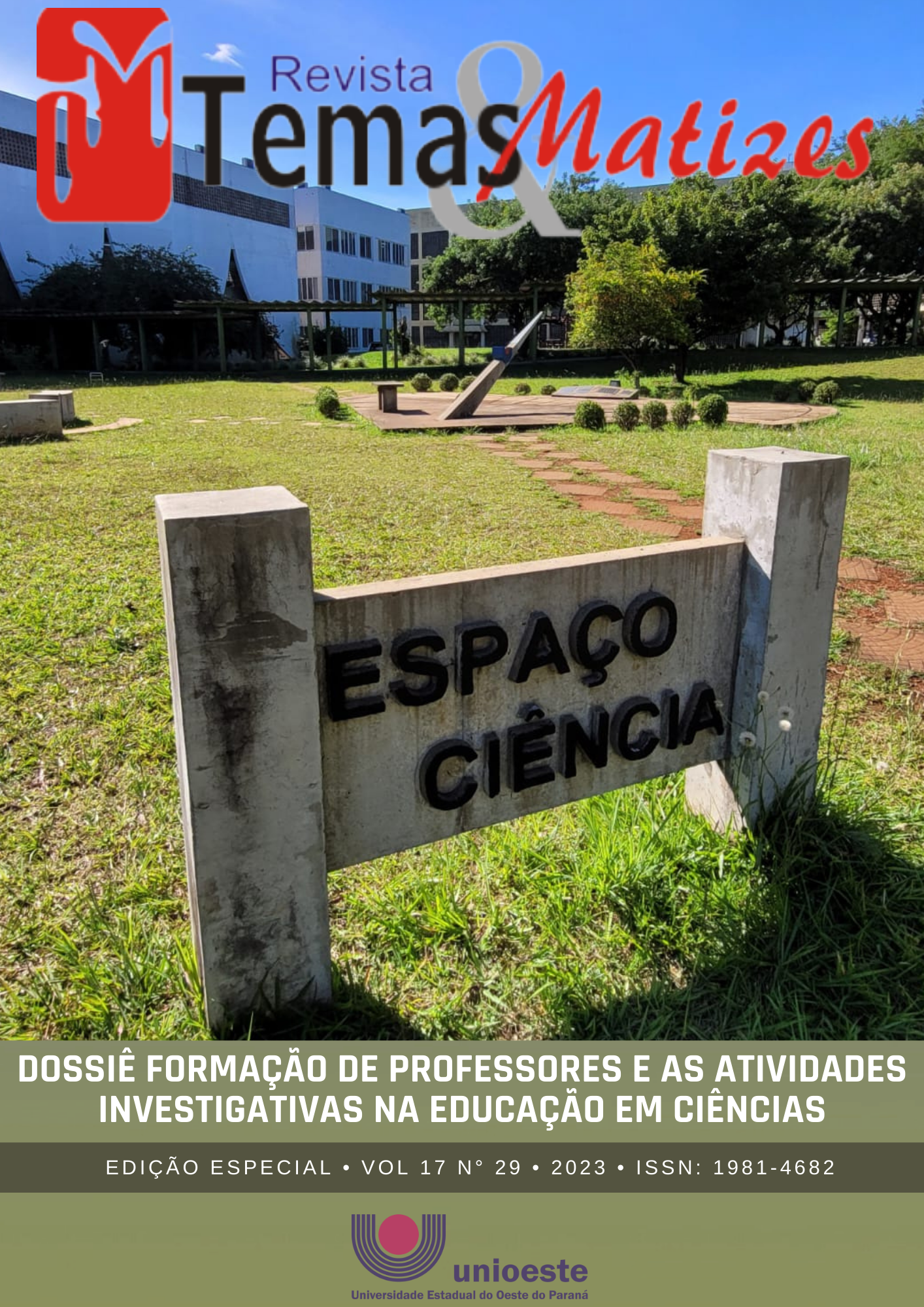HISTORY AND PHILOSOPHY OF SCIENCES: CONCEPTIONS OF LANGUAGE TEACHERS AND THEIR TECHNOLOGIES
DOI:
https://doi.org/10.48075/rtm.v17i31.31927Keywords:
Conceptions, Science, Teachers, Basic educationAbstract
Considering the social advances and the consequences evidenced after the advent of web 2.0, through personal and personal experiences, it is possible to notice that in basic education, for some, there is still a dilemma about what science is . There is a kind of conflict that deals with the areas of Natural Sciences (Physics, Chemistry and Biology) and Mathematics versus Languages and their Technologies (Portuguese Language, Writing, English Language, Spanish Language, Art and Physical Education) and Human and Social Sciences Applied (History, Geography, Philosophy and Sociology). Thus, through a descriptive, interpretative and qualitative investigative work, this research seeks to analyze the conceptions of basic education teachers about what science is, about pedagogical practices adopted in the classroom, considering their professional training based on works by Santos ( 2008), Weber (2008), among others. For this, through an electronic questionnaire, we collected some reflections of 03 (three) teachers, aiming to know their conceptions about science in their practices as education professionals, in the area of Languages. We conclude that the conceptions are wide and diversified, and that the scientific work is always directly or indirectly inserted in the school context, however, there are still some impasses regarding the continuing education of teachers.
References
ALLCOTT, H.; GENTZKOW, M. Social media and fake news in the 2016 election. Journal of Economic Perspectives, [S.l.], v. 31, n. 2, p. 211-236, 2017. Disponível em: https://www.aeaweb.org/articles?id=10.1257/jep.31.2.211. Acesso em: 11 mar. 2024.
ANDRADE, M. M. Como preparar trabalhos para cursos de pós-graduação: noções práticas. 5. ed. São Paulo: Atlas, 2022.
BACON, F. Novum Organum. Tradução de José Aluysio Reis de Andrade. São Paulo: Nova Cultural, 1999.
CHALMERS, A. F. O que é ciência afinal? Tradução de Raul Filker. Local: Editora Brasiliense, 1993.
CHIBENI, S. S. O que é ciência? Departamento de Filosofia. Instituto de Filosofia e Ciências Humanas (IFCH). Universidade de Campinas (UNICAM), 2004.
FREIRE, P. A importância do ato de ler: em três artigos que se completam. 51. ed. São Paulo: Cortez, 2011.
GIL, A. C. Como elaborar projetos de pesquisa. 4. ed. São Paulo: Atlas, 2002.
GONSALVES, E. P. Iniciação à pesquisa científica. 3. ed. Campinas: Alíneam, 2003.
HIDALGO, M. R.; LORENCINI JUNIOR, A. Reflexões sobre a inserção da História e Filosofia da Ciência no Ensino de Ciências. História da Ciência e ensino, [S.l.], v. 14, p. 19-38, 2016. Disponível em: https://revistas.pucsp.br/index.php/hcensino/article/view/26106. Acesso em: 11 mar. 2024.
HUME, D. Investigações acerca do entendimento humano. Tradução de Anoar Aiex. São Paulo: Nova Cultural, 1999.
LANKSHEAR, C. Changing Literacies. New York: McGraw-Hill in, 1997.
MINAYO, M. C. de S. (ORG.). Pesquisa social: teoria método e criatividade. 17. ed. Petrópolis: Vozes, 1994.
MOITA LOPES, L. P. Pesquisa Interpretativista em Linguística Aplicada: a linguagem como condição e solução. DELTA, v. 10, n. 2, p. 329-338, 1994.
MOURA, B. A. O que é natureza da Ciência e qual sua relação com a História e Filosofia da Ciência? Revista Brasileira de História da Ciência, [S.l.], v. 7, n. 1, p. 32-46, jan./jun. 2014. Disponível em: https://rbhciencia.emnuvens.com.br/revista/article/view/237. Acesso em: 11 mar. 2024.
OLIVEIRA, B. J. N. A evolução da noção de ciência ao longo do tempo. Revista Diaphonía, [S. l.], v. 4, n. 1, p. 48–55, 2018. DOI: 10.48075/rd.v4i1.19799. Disponível em: https://e-revista.unioeste.br/index.php/diaphonia/article/view/19799. Acesso em: 11 mar. 2024.
POPPER, K. A lógica da pesquisa científica. Tradução de Leonidas Hegenberg e Octanny Silveira da Mota. São Paulo: Cultrix, 2008.
RUDIO, F. V. Pesquisa descritiva e pesquisa experimental. In: RUDIO, F. V. Introdução ao projeto de pesquisa científica. Petrópolis: Vozes, 1998. p. 69-86.
SANTOS, B. de S. Um discurso sobre as ciências. São Paulo: Cortez, 2008.
TRIVIÑOS, A. N. Introdução à pesquisa em ciências sociais: a pesquisa qualitativa em educação. São Paulo: Atlas, 2010.
VILELA, M. L.; SELLES, S. E. É possível uma Educação em Ciências crítica em tempos de negacionismo científico? Caderno Brasileiro de Ensino de Física, [S. l.], v. 37, n. 3, p. 1722-1747, 2020. DOI: 10.5007/2175-7941.2020v37n3p1722. Disponível em: https://periodicos.ufsc.br/index.php/fisica/article/view/74999. Acesso em: 11 mar. 2024.
WEBER, M. A ciência como vocação. In: WEBER, M. Ciência e política: duas vocações. São Paulo: Cultrix, 2008.
Downloads
Published
How to Cite
Issue
Section
License

This work is licensed under a Creative Commons Attribution-NonCommercial-ShareAlike 4.0 International License.
Aviso de Direito Autoral Creative Commons
Política para Periódicos de Acesso Livre
Autores que publicam nesta revista concordam com os seguintes termos:
1. Autores mantém os direitos autorais e concedem à revista o direito de primeira publicação, com o trabalho simultaneamente licenciado sob a Licença Creative Commons Attribution que permite o compartilhamento do trabalho com reconhecimento da autoria e publicação inicial nesta revista.2. Autores têm autorização para assumir contratos adicionais separadamente, para distribuição não-exclusiva da versão do trabalho publicada nesta revista (ex.: publicar em repositório institucional ou como capítulo de livro), com reconhecimento de autoria e publicação inicial nesta revista.
3. Autores têm permissão e são estimulados a publicar e distribuir seu trabalho online (ex.: em repositórios institucionais ou na sua página pessoal) a qualquer ponto antes ou durante o processo editorial, já que isso pode gerar alterações produtivas, bem como aumentar o impacto e a citação do trabalho publicado (Veja O Efeito do Acesso Livre).
Licença Creative Commons
Esta obra está licenciada com uma Licença Creative Commons Atribuição-NãoComercial-CompartilhaIgual 4.0 Internacional, o que permite compartilhar, copiar, distribuir, exibir, reproduzir, a totalidade ou partes desde que não tenha objetivo comercial e sejam citados os autores e a fonte.


